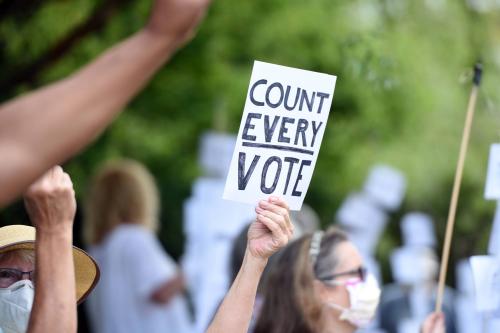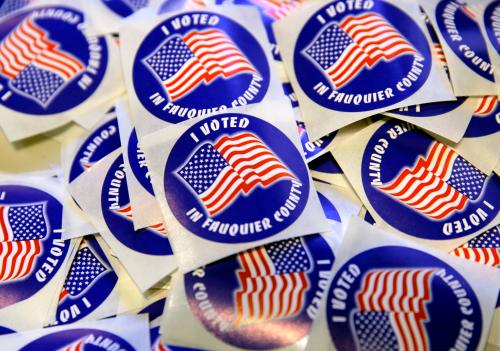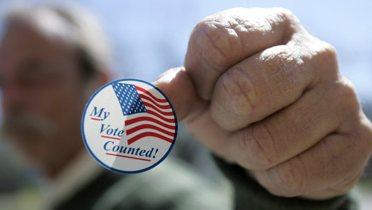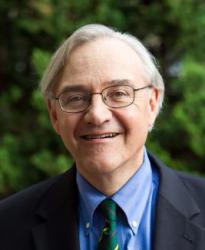The United States should require all of its citizens to vote. Doing so will push back against voter suppression and tear down barriers to participation because the best way to protect the right to vote is to underscore that it is also a civic duty.
This is the message of a report issued this week by the Universal Voting Working Group, a joint initiative by the Brookings Institution and the Ash Center for Democratic Governance and Innovation at Harvard’s Kennedy School. Its opening words:
“Imagine an American democracy remade by its citizens in the very image of its promise, a society where the election system is designed to allow citizens to perform their most basic civic duty with ease. Imagine that all could vote without obstruction or suppression. Imagine Americans who now solemnly accept their responsibilities to sit on juries and to defend our country in a time of war taking their obligations to the work of self-government just as seriously.”
We argue that the United States should require citizens to participate in elections as Australia and two dozen other nations do. As it is with jury service, so it is with voting: Asserting a civic duty is the best way to guarantee the right this duty entails. Our report, “Lift Every Voice: The Urgency of Universal Civic Duty Voting,” aims to build on the achievements of the civil rights, voting rights and democracy movements by continuing to push for a series of reforms to ease access to the ballot box and make voting simpler and easier.
Our working group was under no illusions that mandatory participation in elections would be adopted quickly or easily in the United States. Between now and November 2020, there is much that needs to be done simply to ensure that voters will be able to cast ballots safely. For the medium term, we urge that the first steps toward universal civic duty voting might begin with local or state experiments of the sort that have, in our nation’s past, pushed good ideas to the national stage.
But we also hope to shake up the nation’s voting debate to lay out an expansive vision of what our democracy could and should look like, and to show that this idea, which has only rarely entered the American debate, is exceedingly practical. Australia has had mandatory participation on the books for nearly a century, and it has worked.
Over the course of 18 months, our working group studied systems of universal voting, met with civil rights, voting rights and democracy advocates, immigrant rights groups, state legislative organizations, election officials at all levels, and many others to refine our ideas and create a detailed policy proposal.
Our intervention reflects a sense of alarm and moral urgency, but also a spirit of hope and patriotism. That we consider 50% turnout in midterm elections a historical achievement (as was the case in 2018) should be a warning. The disparities in turnout between different groups, detailed in our report, are equally worrying. Boosting turnout, we insist, is a matter of justice and representation. This mandate also takes seriously the Declaration of Independence’s insistence that political legitimacy depends on the “consent of the governed.” Our turnout levels, at 60 percent on the high end in presidential elections and 40 percent in the typical case in midterm elections, means that elected leaders earn their legitimacy from a small group of individuals even in landslide elections. This suggests that many voters are withholding their consent from our government, passively in some cases and actively by the most alienated voters.
Civic duty voting shifts elections from an “opt-in” to an “opt-out” system. It does not force voters to elect any one candidate and therefore, we believe, it survives constitutional muster. In addition to allowing for a wide variety of exceptions to the voting mandate, the policy laid out in the report also encourages None of the Above options to be added to the ballot. Any civic duty voting policy should allow for religious and conscientious objection to voting.
Casting a ballot in countries with civic duty voting is often easier than it is in the United States. Registering to vote is a straightforward and accessible process, if not automatic; requesting a ballot or finding your polling place typically does not require calls to your local supervisor of elections or constantly checking online resources to ensure that your polling location has not changed; and voting in person does not mean standing in line for hours.
Many opponents of compulsory participation worry about imposing penalties on non-voters. We are careful to insist that fines for non-voting not be more than $20, that neither civil nor criminal penalties would be imposed for not paying the fine, that the amount would not compound over time, and that it would be set aside for those willing to meet a modest community service requirement. Included in the proposal is a conscientious objector provision for those who have religious or moral qualms about voting, and provide a wide range of legitimate reasons voters could give to escape any penalties. In Australia, only 13 percent of non-voters ever have to pay the penalty. Our emphasis is not on imposing sanctions but on sending a strong message that voting is a legitimate expectation of citizenship in a nation dedicated to democratic self-rule.
At a time when our nation is in the midst of a new struggle to end entrenched racial injustice, we see universal voting as a way to amplify long-suppressed voices. The John Lewis, whose loss we mourn and whose life we celebrate, risked his life again and again on behalf of voting rights and full participation. “Voting access is the key to equality in our democracy, Lewis declared. “The size of your wallet, the number on your Zip Code shouldn’t matter. The action of government affects every American so every citizen should have an equal voice.”
Our proposal is rooted in the obligation of all citizens to our democracy and represents an effort to make our system more equal and more participatory. We hope it can serve as a spur for a new and more vibrant democracy.
The Brookings Institution is committed to quality, independence, and impact.
We are supported by a diverse array of funders. In line with our values and policies, each Brookings publication represents the sole views of its author(s).








Commentary
Why shouldn’t voting be mandatory?
July 24, 2020